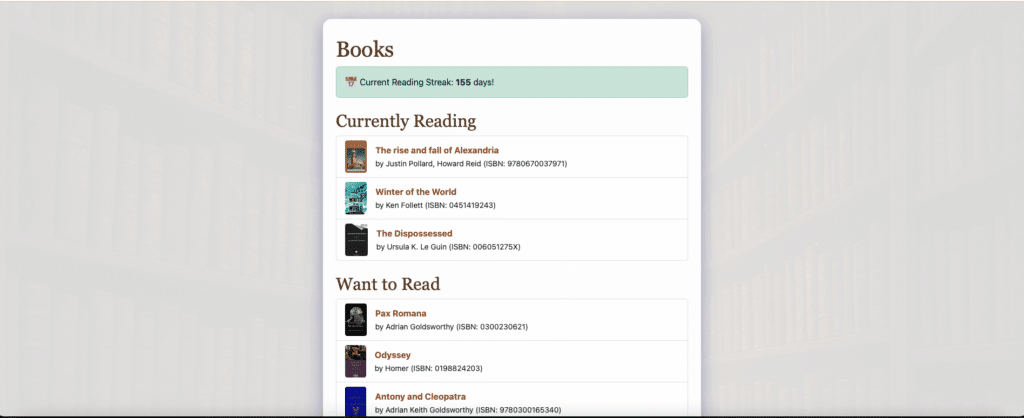Bibliotheca is the new open-source web app winning over book lovers who want to control their personal libraries and track their reading habits completely privately, without depending on third-party services. Developed in Python using the Flask framework, Bibliotheca stands out for its user management, simplicity, and transparency, giving each reader total control over their library, progress, and reading statistics.
A Flexible, Private Personal Library Manager
Unlike commercial platforms like Goodreads or StoryGraph, Bibliotheca can be installed and run on your own server (or your computer), offering complete independence over your data with no ads or tracking. Key features include:
- Easily Add Books by ISBN: The app automatically fetches covers and metadata, speeding up the creation and organization of your collection. It also allows for bulk imports from Goodreads and other services via CSV files.
- Reading Progress Tracking: Mark books as “Currently Reading,” “Want to Read,” “Finished,” or just “Library Only,” so you always know your reading status at a glance.
- Reading Logs and Streaks: Record your daily reading activity, track consecutive reading days, and visualize your progress over time.
- Monthly Visual Wrap-Ups: Generate shareable collages of book covers completed each month, ready for social media or personal memories.
- Advanced Search: Search Google Books directly from the app to easily add new titles.
- Modern, Responsive Interface: Built with Bootstrap for a seamless experience on desktop and mobile devices.
Easy Deployment: Docker, Compose, or Manual Installation
Bibliotheca is easy to deploy. You can run it on any system using the official Docker images, so there’s no need to manually install Python dependencies. Simply install Docker and Docker Compose, and you’re ready to launch a container with all your data stored locally.
Example one-liner deployment:
docker run -d \
-v bibliotheca_data:/app/data \
-p 5054:5054 \
--name bibliotheca \
pickles4evaaaa/bibliotheca:latest
A sample docker-compose.yml file is also provided for advanced users, allowing timezone, process count, and other options to be set via environment variables. By default, Bibliotheca uses SQLite as its database but can be configured for more complex environments.
Complete Control Over Your Data – and Open Source
Bibliotheca is open-source software licensed under MIT. All code is available on GitHub, so anyone can audit, contribute, or customize it to fit their needs. All data is stored locally and never sent to any external server, a key point for privacy-minded readers.
Community and Contributions
The developer, who comes from a networking background rather than professional programming, welcomes others to contribute, report bugs, and suggest new features. The project’s philosophy is to keep the app simple, practical, and constantly improving with help from the community.
Conclusion
As the digitalization of leisure and culture accelerates, Bibliotheca is an ideal choice for anyone looking to manage their personal library, log their reading habits, and access advanced statistics—all while retaining full control over their data and avoiding closed, commercial platforms.
More information, source code, and documentation at:
https://github.com/pickles4evaaaa/bibliotheca

